Armagh v Donegal Statistical Analysis

Throughout the 2015 Ulster Senior Championship, Ulster GAA will be compiling a report of the key statistics from each match. The reports will look at a range of factors contributing to game play, including possession breakdown, kick out success, possession to scores ratios and turnover stats.
The purpose of this project is to identify the key differences between team performance, and possibly help pin point where the key differences existed. Ultimately, it is hoped to identify the key area each team needs to address ahead of their next championship outing in 2015.
Kick Out Statistics
The battle for possession from kick outs swayed in Armagh’s favour, winning 22 (56%) to Donegal’s 17 (44%). The same pattern prevailed in both halves, with Armagh edging the first half battle by 3, and the second half by 2. This marginal dominance reflects the fact that Armagh had a greater number of kick outs, 21 to Donegal’s 18. Armagh will take comfort from the fact that they won 15 of their 21 kick outs (71%), while Donegal were less successful, winning 11 from their 18 kick outs (61%). Neither team was overly reliant upon short kick outs, although both will be concerned with the volume of their own kick outs lost to break ball (Armagh – 6, Donegal – 5).
Figure 1: Kick Outs Won
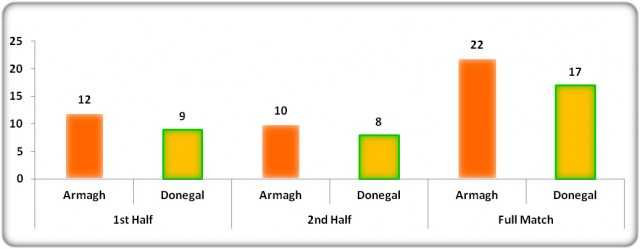
Figure 2: Kick Out Breakdown
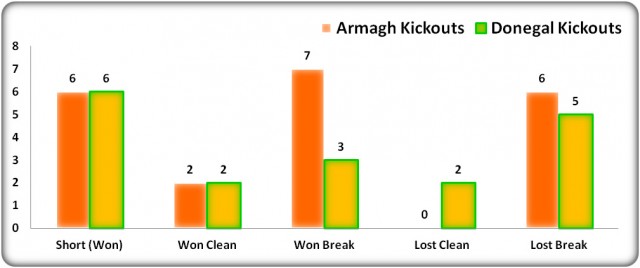
Turnovers
Despite winning more possession from kick outs Armagh failed to capitalise, with one of the reasons being their higher turnover count in comparison to Donegal. Armagh totalled 25 turnovers, while Donegal only lost possession on 22 occasions. Armagh will be in no doubt as to their main area for concern, losing 11 possessions through slack hand passing. Donegal will be concerned that their turnover count increased from their preliminary match against Tyrone (19). Of particular concern will be that they failed to improve on the number they lost in the tackle, and actually increased the possessions lost in contact from 7 versus Tyrone, to 8 in their clash with Armagh.
Figure 3: Turnovers
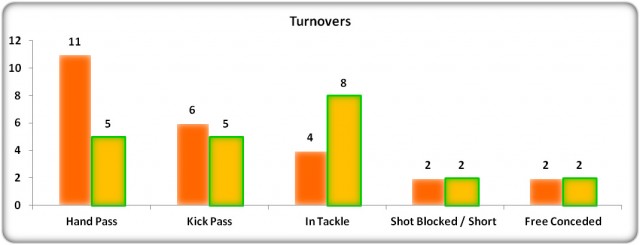
Possession to Scores Ratios
Armagh’s superiority in the kick out battle enabled them to shade the possession share, with 46 (51%) possessions to Donegal’s 44 (49%). There was a balance evident thereafter, with both teams creating the same number of attacks (32) and subsequent shots (23). However, as has been the case in the past number of seasons, the reason for Donegal’s victory appears rooted in their ability to convert chances, scoring 13 times from 23 shots (57%), while Armagh could only manage 8 scores from the same number of shots (35%). Armagh had a possession to scores conversion rate of 17%, while in contrast Donegal converted 30% of all possessions to scores. Clearly Donegal’s shot success is a key factor in their conversion rates, with a rate of 54% v Tyrone, and an improved 57% against Armagh.
In analysing for differences in shot success, Armagh will be drawn towards their wide count of 9 shots, and their 3 shots that were blocked or saved. Review of their failed shots will help identify the reasons for their lack of success. It is arguable some may have been poor choice of option, while others may have been poorly executed.
Figure 4A & 4B: Possession to Scores Ratios & Shot Outcomes
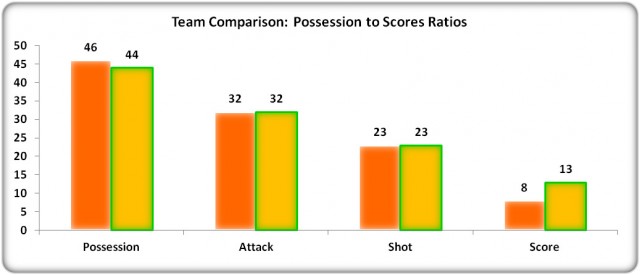
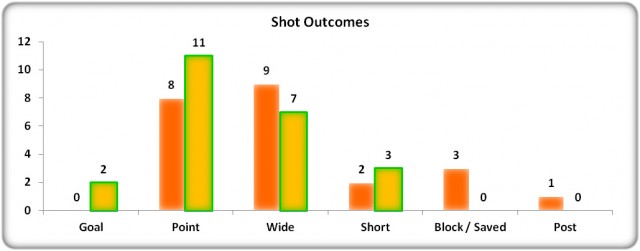
Not only were Donegal more effective at converting shots, they were also responsible for both goals scored, and ensuring their productivity rating was far superior to Armagh. In fact, Donegal were more than twice as productive, delivering the highest rating of the USFC 2015 thus far, 3.9 points per 10 possessions, while Armagh struggled to the weakest return of the USFC 2015, 1.7 points per 10 possessions. Using their productivity as a guide it gives an excellent indication as to the difference between the 2 teams. In order to even break even on the scoreboard, Armagh would have needed to secure 63 possessions, while limiting Donegal to just 27.
Figure 5: Productivity
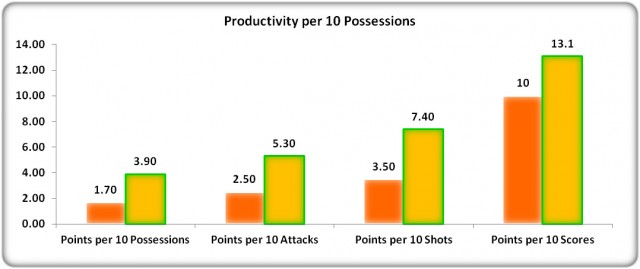
Summary
On the final scoreboard there was a gulf between the two teams. However, when we look at the breakdown of the game, both teams performed equally effectively up to the final stage, taking the scores. Armagh won the kick out battle, which translated to superior possession share, despite having turned over possession 3 times to Donegal. A fairly balanced share of possession led to both teams creating the exact same number of attacks (32) and fashioning the same number of scoring chances (23). However, the ‘gulf’ between the teams was due solely to Donegal’s greater efficiency in front of goal (57% to Armagh’s 35%) that enabled them to take more scores, including 2 goals, which ultimately resulted in a 9 point win.
Armagh
Armagh edged the kick out possession battle, and can certainly take some positives from this ahead of their meeting with Wicklow in the qualifiers. They did not turnover a concerning volume of possession (25), but, they will be keen to reduce the count towards 20. Their main focus should be the costly basic hand passing errors (11), some of which were undoubtedly unforced, and were immediately punished by Donegal.
Another crucial improvement need for Armagh will be their shot conversion, having taken only 8 from 23 chances, a success rate of 35%. At the business end of the season, teams will be expecting to achieve success upwards of 60% from all shots taken. In order to win games with a conversion rate of 35%, Armagh will need to win double the possession of their opponent. The more achievable option is to improve their scoring ratio, through better shot selection and execution.
Donegal
As has become common with this current Donegal squad, they displayed excellent efficiency in front of goal, taking 13 scores from their 23 shots (57%), 2 of which were goals. Their overall productivity increased from 3.8 points per 10 possessions against Tyrone to 3.9 versus Armagh.
However, their main issues against Tyrone prevailed once again in this game, having coughed up a further 8 possessions in the tackle, and also lost 5 of their own kick outs to break ball. Donegal do not win games based on dominating possession, but on their efficiency when in possession. Therefore, it is vital that they do not lose easy possessions, as this could severely impact on their ability to deliver sufficient scores to win subsequent matches.






